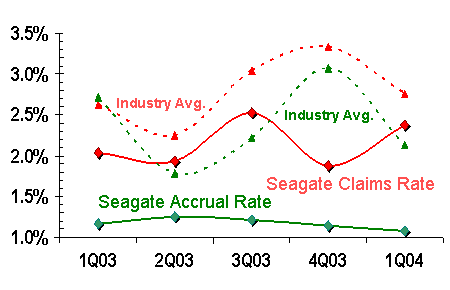August 3, 2004 |
ISSN 1550-9214 |
Seagate's 5-yr. Warranties:Is it a bold marketing move that will increase sales? Or is five years a bit too long for a product in such a fast-changing industry?Five years ago, who could have imagined that an iPod music player the size of a deck of cards could hold 40 Gigabytes of data? Years ago, they used to help us fathom the vastness of digital storage capacity by saying how many bibles could fit onto the head of a pin. Now they can wow us by saying an iPod will hold 8,000 songs, or virtually every CD and LP you ever owned. It's a long time since 8-inch floppy drives were the industry standard for desktops. Five years from now, data storage appliances might hold hundreds or perhaps even thousands of Gigabytes of data in a pocket-sized form factor. Disk farms might hold Terabytes or Petabytes or whatever is a byte followed by dozens of zeros. What today is cutting edge technology may not be worth replacing in a few year's time. It's not like automobiles, where people really do expire their warranties on mileage alone, and people really do hold onto their vehicles long after the loan is paid off. In the computer business, three years is old. Industry's Best WarrantyLast week, Seagate Technology LLC announced a lengthening of the duration of the warranties for its non-OEM internal disk drives from three years to five. In the announcement, Seagate said the "world's most reliable hard drives now feature industry's best warranty protection," which echoes some of the slogans one might typically find in a passenger car advertisement. Two questions come to mind. First, is this a bold and brilliant marketing move likely to increase Seagate's sales as customers begin to equate longer warranties with higher reliability, a la Hyundai or Chrysler? And second, will it have much impact on the company's actual costs if one assumes that relatively few customers will actually want to hold onto their drives that long and possibly make a claim in years four or five? Internal disk drives are typically out of sight, save perhaps for an occasionally blinking light on the front panel of the computer. But internal disk failures can be catastrophic events if data is lost. Especially in the distribution channels through which Seagate is making these five-year warranties available, buyers know the value of reliability and the cost of failures. Individual users may not know the difference, but resellers, systems integrators and distributors who actually decide what to put in the box know the value of a disk drive warranted to last five years. Joe Cousins, Seagate's senior director of global channel marketing, cited two reasons for the warranty lengthening: recent reliability increases and customer demand. "We've been investing in R&D, Six Sigma, and overall operational excellence for a long time now," he told Warranty Week. "And that's what's enabled us to offer a five-year warranty. We think we have the lowest AFR [Annualized Failure Rate] in the industry as a result. One way to express that is how we warrant our products." Besides increased reliability, he said this also is something that customers expressed an interest in getting. "We're pretty active in going out and talking to our customers, making sure that we're offering the right types of programs to make them successful," Cousins said. "We formally go out at least once a year, and get in front of our target market segment and ask them what's important to them in choosing a disk drive supplier. And this one was high on the list." Cousins said it was basically the customers who decided on five years, as opposed to four or perhaps seven years. "We got different feedback on the warranty length, and in the end decided that we really wanted to make a statement about our quality and reliability, and we wanted to show our customers that they can trust our brand." That came down to choosing five years. Marketing Campaign PlannedHe said Seagate believes that warranty already is an important component of a customer's purchase decision. So of course this announcement will be mentioned as boldly and as often as possible in the company's promotional materials. "We're actively working on that internally," he said. Last week's press release drew some trade press coverage, but now that's going to be followed up with some paid advertising to drive the message home. "Obviously that's something we're going to want to communicate as often as possible to our target customers." Cousins said the terms of its product warranties for OEM customers will more or less be unaffected by this announcement. This warranty lengthening applies only to internal disk drives sold through dealers, resellers, distributors, and systems integrators. Nevertheless, it applies worldwide. Cousins said it would be impractical to provide different terms in North America, Europe, and Asia, because disk drives sold through indirect channels can move around the world so easily. Besides, when Seagate did its customer research, it did so worldwide. "And there was a uniform need there," he added. Cousins noted that it wasn't too long ago that Seagate offered one-year warranties on certain products, with an option to buy an additional two years of extended warranty coverage. That program was basically terminated by this announcement. The warranties can't be extended beyond five years. Obviously, that will cost the company a bit of revenue, and the lengthened product warranties are likely to increase the cost of sales slightly. But it's hoped that the positive publicity and the brand boost will increase sales, and more importantly, market share. "We'll be rewarded with more business," Cousins said. "But our customers are going to make that decision." It turns out that Seagate already is a bit below the already-low industry average for warranty costs as a percent of revenue. Warranty claims have been in a range of 1.9% to 2.5% for the past five quarters, and warranty accruals have been in a 1.1% to 1.3% range. That compares to an industry which, including Seagate, has been in a 2.3% to 3.3% range for claims and 1.8% to 3.1% for accruals. At no point during the past five quarters has Seagate been at or above average costs for its industry (see chart below). Seagate Claims & Accruals | |||||||||||||||||||||||||||||||||||||||||||||||||||||
| |||||||||||||||||||||||||||||||||||||||||||||||||||||








